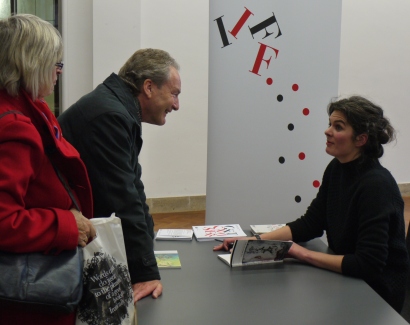 MLF Chapter & Verse
MLF Chapter & Verse
The Manchester Literature Festival Blog
Review: Tara Bergin & Caoilinn Hughes
Young Digital Reporter James Varney reviews our lunchtime event with debut Irish poets Tara Bergin and Caoilinn Hughes…
At Manchester Central Library, I arrive to hear Tara Bergin and Caoilinn Hughes knowing of them only that they are Irish poets, who will be reading from their debut poetry collections, published by Carcanet. There is both the expectation of something familiar, and the anticipation of something new, and I am ready to discover something.
Caoilinn Hughes is introduced first, and I no longer have to imagine how her first name might be pronounced (key-lynn). Her opening poem, ‘Avalanche’ unfolds along its length as if a memory dragged up, journeying through the abstract power of forces of nature into a specific human experience and feeling, at the end of its journey, distinctly formative. This is to set the character of Hughes’s set.
Hughes’s poetry explodes the objects and incidents it focuses on, she tells us of the influence of science upon her writing. In another life, she tells us, she would have been a scientist, introducing a pair of poems responding to the work and life of Johannes Kepler. Kepler, we hear, devoted time to exposing the ‘Harmony of the Spheres’, in the belief that the motions of the planets, translated into a musical score would create a piece of great beauty. Much like Kepler, Hughes takes a scientific eye to the world, illuminating those harmonies that hold it together, and exposing it as a sum of innumerable parts.
As a result, Hughes weaves a dense tapestry of dissected parts, which finds itself punctuated by characters who blink in and out of view in a conscious stream reminiscent of the inhabitants of Dylan Thomas’s Llareggub in ‘Under Milk Wood’. Regardless of how much or little they are revealed to us, these characters remain fully formed. Hughes assures us that her grasp of a human experience is not limited to scattered glimpses – her poem ‘Communion Afternoon’, where she tells of a child ‘disgusted at the injustice of being small and inarticulate and atheist’, gains an applause which breaks the surrounding hush of her set.
Tara Bergin (pictured) leads with ‘At the Garage’, exhibiting a flash of dry nihilism and confident, confrontational womanhood, a stygian crawl to her voice. Bergin reading appears in complete control of the diverse characters she has created. In contrast to the briefly populated and unpicked world of Hughes, Bergin’s poetry is strongly inhabited. There is a compelling cynicism, and knowingness in the voices and roles of women in Bergin’s poetry. Little of them is thrust upon you, and in both writing and performance there is the sense that both these women and Bergin are keeping their cards close to their chest. Bergin masters an art of intrigue; there is a world which her created subjects inhabit, and it is fully implicit in every facet of them.
Not limited to intrigue, Bergin also trades in theatricality, bombast and the mythic. All this she achieves in her layering of humanities upon humanities. Her concentration of human relations manifests itself confidently in the gothic and muted suffering of ‘White Crow’, ‘Bridal Song’ and ‘The Undertaker’s Tale of the Notebook Measuring 1x2cm’, and equally in the understated comedy of ‘At the Lakes with Roberta’. Bergin shows her understanding of the ways in which we all fit together, in tight, powerfully conceived poems.
Bergin’s closing poem, and perhaps my favourite of her set, ‘Stag Boy’ does something to dispense with a realism that exists in her other readings. More magical, mythic realism this: an account of a drunken young stag, blundering aboard a train, in which she maintains that detached, wise and dry observing voice in critique of a frequent and familiar masculinity. Bergin manages to capture a relevance in her command of human characters in her poetry, the voices of which, for all their detachedness, never feel too far from reality.
I arrived ready to discover. What I discovered were two remarkable poets, distinct in voice, human in their understanding, and both in command of an undeniable power.
